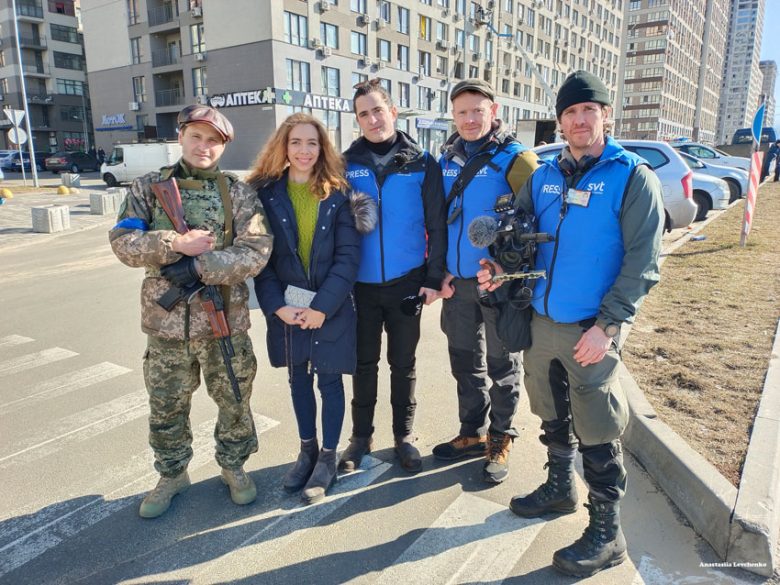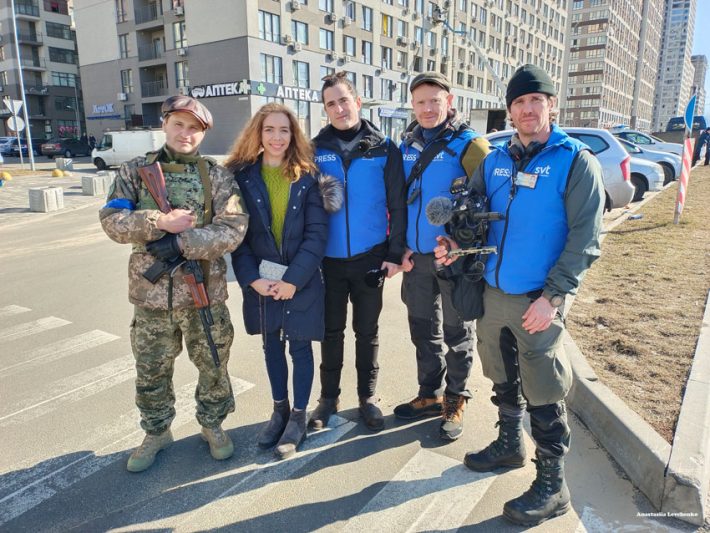By Anastasiia Levchenko
On the 24th of February I was at home, sleeping, when the sound of fireworks woke me. As they continued to get louder I realised these weren’t fireworks. War had started. From that moment my life was divided into «Before» and «After». The threat of the Russian attack, which had been talked about on every Ukrainian TV channel for weeks before, had become a horrible reality. More than three weeks later, the sound of sirens, sleepovers in the shelters or underground, and the lack of food and medicine are a part of our people’s lives. A new concept called “relative security” is used whenever we send messages to friends and family. If I sent this message after an attack it means I’ve found a safe place. It could be a basement, a bathroom, or any other place in an apartment which is far away from the windows. Yet despite the fear, I won’t leave my country. I feel that I can be useful here and I don’t want to leave my home behind. Sadly, what we’re experiencing has become the norm. Last week as I drove home from a Kyiv hospital where I’d been interviewing doctors and patients, with bombs falling next to me, the sound of the bombs falling around me was less scary than I expected.
I have always loved being a journalist. I started when I was 17, and now I have experience as a TV journalist, TV host and press secretary. My last job was in investigations, but I lost that position when the war began. Priorities have changed and there is currently no market for the work I was doing. Instead I’m working with foreign media to try and tell our stories globally.

I`ve always considered myself an active person with a lot of ambition and a willingness to work. Working with my friend and colleague, Anastasiia Zarechenskova, also a journalist, we began to connect people who need help with those who want to offer it. We are collecting humanitarian aid and delivering it to people, including territorial defence. We also joined the Coalition For Women in Journalism (CFWIJ) to inform the community abroad about the real situation in Ukraine. The CFWIJ supports us in providing employment for Ukrainian journalists who have lost their jobs because of the war. They are ready to provide Ukrainian journalists with ammunition too. Currently I’m working with our government to create a central coordination centre to establish humanitarian aid delivery from our friends abroad. The system works locally and I receive all humanitarian aid for journalists and civilians in my friend’s apartment in Kyiv. We are also doing continuous interviews for our colleagues abroad to inform society about the current situation.
My friend – Anastasia Zarechenskova – worked as an investigative journalist on television before the war started. Her project came to a halt on 24th February.
“I remember that day so clearly,” she tells Media Diveristy Institute.
“I wanted to get enough sleep because the last few days I was too tired from the amount of work I’d been doing. I`m from the Lugansk region, so I remember how the war started there in 2014. That time I decided to evacuate to Kyiv. And now, when the same horror happens here, I won’t leave my country. I’m helping volunteers and continue to inform people in Ukraine and abroad and it’s a vital job.”
Tatiana Dankevych works as a press secretary for the Ukrainian deputy – Valerii Sterniychuk, part of the political Party “Sluga Narodu” (which can be translated as a “Civilian’s servant”). During the first days of the war she was living in a basement with her family, before moving to the West of Ukraine. Now, like all of us who can, she is continuing to do her job. Currently she is providing humanitarian aid to her team as well as helping refugees to find accommodation.
“We are doing everything to help those people, who are suffering because of the war,” she says.
“We found volunteers to cook food and settle refugees for free. Also we are searching for drivers to deliver humanitarian aid from Western countries to Ukraine. Then we get it to the places it’s most needed.”
The host of the Ukrainian TV channel, Apostrophe TV, Alina Blokhina, continues to work non-stop with her team. She hasn’t been at home since the 24th of February. Instead she packed all the necessary things, took both of her cats and moved to the TV channel’s building. Currently she combines the responsibilities of a TV host, editor-in-chief and director of TV broadcasting.
While Russian soldiers are shooting near the TV channel’s building, the employees continue their work in the shelter under it.
When the sirens sound, journalists go down to the shelter. If it’s quiet they sleep in the television studio.
“We are eating, sleeping and working together,” says Alina. “We do everything together. It’s something between living in a hostel and taking part in a reality show.” She doesn’t know if their team gets any payment for the overtime job, but it doesn’t matter, they plan to stay in Kiev until Ukraine’s victory comes.
A lot of journalists who lost their jobs have had to change their specialty. Cameramen work as drivers, while journalists with a knowledge of languages assist foreign media. Both need protection and ammunition to report from the frontline, but not everybody has it. Foreign media provide protection for their journalists in Ukraine, but not everybody proposes body armor for Ukrainian colleagues who joined their team. Ukrainian journalists often agree to work without the necessary safety provisions because of lack of any other form of employment. It is similar to working in a freelance job: you are not sure when you are going to have an opportunity to get a job. The precarity of the job is high as you do not know when foreign media will lose their interest in covering the events in your country.
Last week I worked with a team from Swedish National TV – SVT. And I am really grateful to Fridh Kleberg, Lars-Eje and Johan Eckervad for their high professional level and support with everything. It was my first experience of producing for foreign media and I hope that the next ones won’t be worse. When a journalist from Ukraine currently hears that foreign journalists not only want to cover the war but also to help the country in any way they can, local journalists are willing to help them in any way they can and show them everything that needs to be shown. Things that only a local journalist will know.
At the same time a foreign journalists have demands that cannot be met. I have received a lot of messages from foreign journalists asking: “Tomorrow I need 5 interviews and a car with a driver”. Others call you during the night. Despite my willingness to help everyone, such demands are not and should not be normal. Foreign journalists should certainly plan their trips before they arrive in the country.
The Ukrainian Ministry of Defense has to give special press accreditation to anyone from the media who wants to work in Ukraine. This is a process that takes time. I have a friend working for an Arabic TV station who has been waiting for their accreditation for approximately three weeks. Most of the foreign journalists are kind to Ukrainians. Yet despite this, not everybody understands the complex realities of reporting in a war zone. A few weeks ago our colleague Oleksandra Kuvshinova who was working for the US network Fox News lost her life. In another recent incident, another Ukrainian journalist was working for a foreign TV broadcast from a place where Ukrainian soldiers were based. Russian soldiers bombed that place within hours. This incident was not published anywhere. It’s crucial that journalists who come here understand the security risks and are trained in war journalism,so that they share information while keeping our people safe.
In just a few short weeks, journalists’ lives have changed a lot. The only thing which hasn’t changed is our mission. We will fight to keep accurate information flowing across the world, and stand up against Russian propaganda.
Photo Credits: Anastasiia Levhenko
The article has been adapted to English by Diana Kozhuhova, with support from Lizzie Cernik

